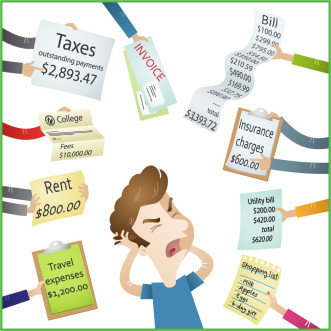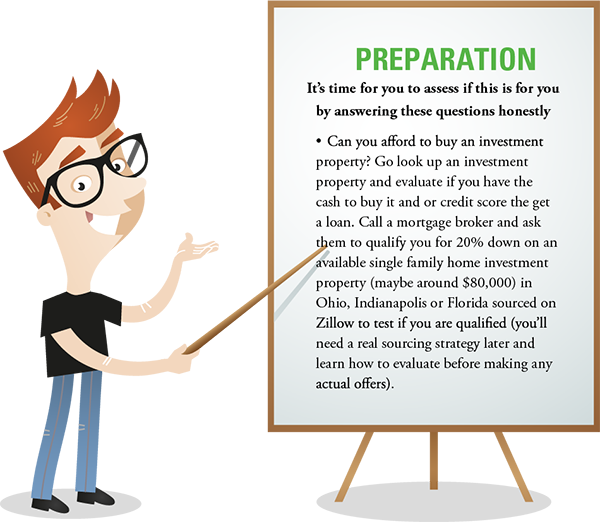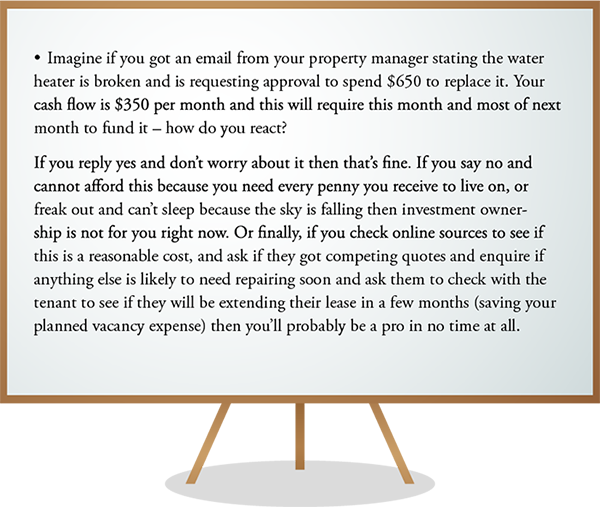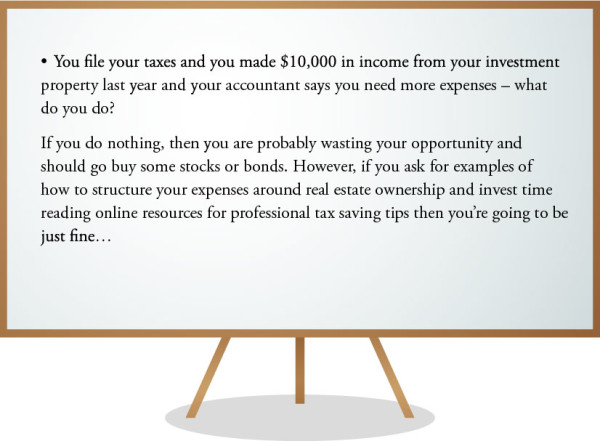Is Investing For You?

IS REAL ESTATE
A GOOD FIT?
There’s no such thing as a universal appeal. There is no investment class that’s right for everyone. Everyone is different and even though that’s a rather trite statement it’s true and it’s also true for investing in real estate. It’s not for everyone. For most perhaps but not for everyone. How do you know if real estate and you are a good fit?
Buying real estate and holding for long term for income and appreciation offers a well-defined path to wealth creation but only if you are prepared to educate yourself and apply a structured approach towards property ownership. For example, ownership doesn’t require you to fix the plumbing yourself but does require you to source and oversee the right property manager to organize the repairs. There are several questions you need to ask yourself to decide if you are ready. Being totally honest with yourself is essential.


SUMMARY
Can you afford it right now?
Owning an investment property means either paying cash for the property or obtaining a conventional loan. Lenders require at least 20 percent down for a single family rental property, this is in addition to closing costs which can equal 3 to 5 percent of the sales price. If you have to scrimp and scrape for these funds, perhaps now is not the best time. Real estate isn’t the most liquid of investments. In fact, it’s not really liquid at all. Oh, and you’ll have to qualify for a mortgage without the benefit of the rental income from the property. At least on your first purchase. Can you comfortably afford the costs associated with the purchase and will the rent more than cover the loan payments? This last question is easily calculated in the Property ROI calculator.
Are you patient?
Slowly, slowly catchy monkey, or in other words with patience real estate can achieve your goals but not over night. Are you able to be a patient investor or do you want to see big profits within a few months? Do you follow the stock markets every day and subscribe to multiple publications offering investment advice? Then real estate may not be your best bet. Real estate investing involves buying and holding for the long term and potentially passing your holdings to your heirs. Building wealth through real estate is a planned out, methodical approach, not a 90-day ticket to success. Read Ignore the Hype: News from Realsville if you think you’re ready to do buy and flip as a beginner.
Can you handle issues?
Can you work thru problems relating to ownership and look at options to resolve them. It’s inescapable that issues will arise and you will need to trade off options to solve them based on the market conditions and your available resources for each issue. I paying attention to monthly operating details and don’t sweat any of the small stuff. I found I did early on with first few properties and don’t worry because common sense combined with a clear set of investment goals is your best weapon against issue. For example I had a water leak and had to decide whether to replace the entire bathroom while fixing and add value to property for longer-term appreciation versus a short-term expense that ate two months cash flow. I opted to do the simple repair and take a short-term approach as I value the potential to use my cash to purchase my next investment over improving the assets I own today because the current market offers the ability to get double digit cash on cash returns. I was fine with expense as I have a maintenance assumption in my annual budget for each property and a moderate reserve across my portfolio. If you can treat each issue as non personal decision and first create a couple of options to solve each problem and then select an option based on consistent guidelines you have for your business then you wont find rental investments raising your blood pressure.
Can you take action?
Are you able to be decisive and act on an opportunity? This doesn’t mean shooting from the hip but defining a simple set of goals, then finding a property and evaluating it and pulling the trigger without getting paralysis by analysis. Buying your first investment property is a significant decision but if you have a plan and have the right sourcing strategy and go in eyes wide open then your rental property should be successful in the long-term. If you sourcing strategy for your rental is to purchase a turnkey investment property already leased with tenants and property management in place then you can remove many of the risks from your investment. For those of you who are parents you’ll relate to the first door is the hardest for a comparison to having your first child and buying your first investment property as you are never truly ready – right!
Do you want to own properties?
Do you like the idea of owning a few houses, condo’s and a duplex or two, rather than google stock? Are you interested in understanding why some of the wealthiest people in the world got there with real estate? If this doesn’t make you the slightest bit inquisitive then you probably wont push yourself to maximize your returns from owning real estate – so why bother? I don’t believe you need to be involved in the color schemes for each room or faucets selected (in fact this can be bad as you wont live in these and many beginners make this expensive mistake) but you do need to care about this as a business opportunity. I value having all my houses in a location be painted the same 3 colors internally so I get economies of scale on purchasing and always have spare paint for touch ups. All I do is help select the colors and make sure my property managers know use only these. Or, can you take the time to understand how to run legitimate expenses thru your property business pre-tax to save 30-50 cents on the dollar in taxes. To take vacations in locations where you want to evaluate and purchase real estate as a write off, I own property for example in Florida and truly appreciate this benefit. That’s the ownership drive I’m talking about.
So here is what you need for real estate investment to be a fit
1. You need to be able to afford it including a reserve for unexpected costs for repairs and vacancies
2. You need the right aptitude; you cant freak out at problems like the
thought of a water leak or eviction
3. You need to act not talk. Owning investment properties is not rocket
science, but requires constant education and action
4. You need to prepare and execute a plan. Understand the opportunity,
define goals, create a simple plan, source and evaluate your property and operate it like a tiny business
5. You need to be interested. To build the know how to manage your
investments effectively




Like it, reality check before getting the foot in the door.
Thanks Lisa. We aim to keep it real!
Wish I had read this before diving in trusting a paid educational company for the first 3 rentals, getting back in after more than 20 years in 2012! I figure I keep coming back to it, the long term wealth accumulation is a fact I can’t escape working toward. Having that “unexpected expense cushion” is REALLY important because things DO happen. Responding with a business / professional attitude is necessary to stay in it for the long haul. I’m starting over again, but with a lot more confidence in myself and this site is a great guidepost for new and seasoned investors alike. Reminders don’t hurt, sometimes honestly evaluating your “course in life” at regular intervals helps you realize change is needed. I agree with the “fine tuning” the plans as you go & things arise. Makes me think of the saying “Don’t throw the baby out with the bathwater!” If r.e. investing is for you, DO NOT GIVE UP! 😀 Thanks heaps, Duncan.
I almost forgot, about the homework… If you really want it, and your current employment won’t allow you ro qualify, you CAN find good investment prospects and Joint Venture with someone who has $ to fund the investment. Draw up an agreement for a # of years and write out how you plan to terminate the JV or buy out a partner. This helps me as I can’t qualify on my own anymore but a good deal will have $ investors wanting to partner with you!